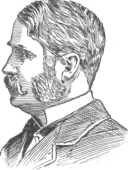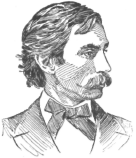GILBERT 766 GILEAD
Description
This page of the book is from "The New Student's Reference Work: Volume 2" by Chandler B. Beach, Frank Morton McMurry and others.
GILBERT
766
GILEAD
Gilbert, Sir Humphrey, an English navigator, was born near Dartmouth, England, in 1539, and after studying at Eton and Oxford abandoned his purpose of studying law and took to the career of arms. He was knighted for good service in Ireland, and served five years in the Netherlands. He wrote a Discourse on the Northwest Passage to India. With his younger half-brother, Sir Walter Raleigh, he sailed in 1578 in quest of the "unknown goal," but his expedition ended in failure. Nothing daunted, he again set sail, and, landing in Newfoundland, took possession of it in the name of Queen Elizabeth. But he lost three of his vessels, and, attempting to return with the other two, his own vessel was lost in 1583. See Hakluyt's Collections.
Gilbert, William, an English physician and physicist, was born in 1540, and died in 1603. He was educated at St. John's College, Cambridge, where he received the degrees of B. A. and M. D. For thirty years he was a practicing physician in London. Queen Elizabeth appointed him court-physician and gave him a pension which enabled him to pursue his scientific work. His magnetic discoveries constitute his most important work. These are recorded in his Treatise on Magnets, Magnetic Bodies and the Magnetism of the Earth, published at London in 1600. Modern views of magnetism date from the publication of this work ; for in it Gilbert offers evidence for thinking that magnetism is a molecular phenomenon, that magnetic quality disappears at red heat, that magnetic forces act equally through air and other non-magnetic bodies and that the earth itself acts as a great magnet. He also describes the phenomenon of magnetic induction.
Gilbert, Sir William Schwenk, English dramatist, was born at London, Nov. 18, 1836, and studied for the bar. He came into note first by his amusing Bab Ballads, contributed t o Fun, and as a playwright and writer of librettos for comic operas, many of which were set to music • by the late Sir Arthur Sullivan. The list of the latter includes the following comedies, burlesques and operas : Pygmalion and Galatea; Trial by Jury; The Sorcerer; H. M. S. Pinafore; Pirates of Penzance; Patience; Iolanthe; Ruddygore; The Gondoliers; and others. All

SIR WILLIAM S. GILBERT
in their day attained great popularity. Others of his productions include The Mikado, which was also a great success, His Excellency and The Mountebanks, besides a number of songs.
Gilder, Richard Watson, American poet and littérateur and editor of The Century Magazine, was born at Bordentown, N. J., Feb. 8, 1844, and was educated at Bellevue Seminary, founded by his father, the Rev. W. H. Gilder. In 1870 he became associate-editor of Smbner's Monthly with Dr. J. G. Hulland, and in 1881 was made editor-in-chief of The Century. Besides his magazine-work, he published a number of volumes of musical verse, whose fine quality and flavor have given him high rank among American poets. These include 7'he New Day, a volume of choice lyrics, published in 18 7 5 ; The Celestial Passion (1887); Lyrics (1885 and 1887); Two Worlds and Other Poems (1801); The Great Remembrance and Other Poems (1893) all being the work of a genuine poet and literary ar-tist. In 1893 Gilder published his Five Books of Song, which embraces most of his poems. His other lyrical and general work includes Fantasy and Passion, In Palestine, In the Heights, A Book of Music, A Christmas Wreath and Poems and Inscriptions. He died Nov. 18, 1909.
Gil'dersleeve, Basil Lanneau, an eminent American classical scholar and professor of Greek in Johns Hopkins University, Baltimore, Md., was born at Charleston, S. C, Oct. 23, 1831, and, after graduating at Princeton, studied in Germany at Bonn, Berlin and Göttingen. In 1856 he was elected professor of Greek in the _ University of Virginia, where he remained till 1876, when he accepted a similar post at Johns Hopkins on the opening of the latter institution. Professor Gildersleeve has since 1880 edited the American Journal of Philology, and has published a Latin Grammar, a Syntax of Classical Greek, Essays and Studies, editions of the Satires of Persius, the Odes of Pindar and a work on Justin Martyr.
Gil'ead is a mountainous district on the east side of the Jordan. Though all is desolate above, on the slopes the growth is luxuriant, and forests of oak and terebinth occur. The district was given to the tribes of Manasseh, Gad and Reuben, because of the multitude of their cattle, and, as a frontier land, was much exposed to invasion. Ramoth, Jabesh and Jazer

RICHARD WATSON GILDER


